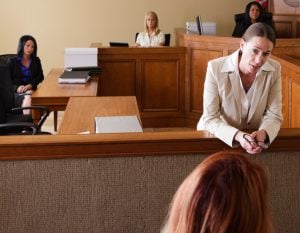Why Defendants Rarely Testify
What problems come up when a defendant testifies?
 Conventional wisdom has it that when a person is blamed for something he didn’t do, he should protest loudly and often, “I didn’t do it!”
Conventional wisdom has it that when a person is blamed for something he didn’t do, he should protest loudly and often, “I didn’t do it!”
However, it’s rare for a person accused of a crime to testify at his own trial. First, he doesn’t have to. If all he’s going to say is, it wasn’t me, the presumption of innocence says that already and carries none of the risks of testifying.
If there’s more to add, like self-defense, mistake, alibi or, I did it, but please give me a break, that’s a different story. He’ll have no choice but to take the stand. However, there are so many risks to testifying that every attorney worth his salt thinks long and hard about recommending it. No matter what the prosecutor’s evidence, if a defendant testifies, that is what will determine the verdict.

Is The Future Of Law Distributed? Lessons From The Tech Adoption Curve
What problems come up when a defendant testifies?
It shifts the burden of proof. The burden is always only on the prosecutor, but when there’s two versions of the same event, jurors compare the prosecutor’s story with the defendant’s. Whether the prosecution made its case or not, if they don’t like how the defendant came off, either because they don’t believe him or just don’t like him, they’ll generally convict.
Without the defendant testifying, a good defense attorney can always find some weakness in the prosecutor’s case to point out, particularly when it comes to cops — for example what could have been done but wasn’t, or what was done wrong.
Since most people arrested are poor and didn’t graduate college (or even high school), many have a tough time articulating their story. No matter how much prep a lawyer does, if a client has memory problems, cognitive or mental-health issues, or just lacks experience speaking to a group, that person will have a tough time explaining himself and dealing with cross-examination. He may have said one thing to police at one time and changed it another. It might be tough for him to explain why he waived Miranda rights and confessed if he didn’t commit the crime. False confessions are often made by vulnerable people — adolescents, the intellectually challenged, or drug users coming off a high and promised by police that confessing will get them back on the street. Getting these same people to coherently explain why they confessed is next to impossible.
Sponsored

Legal AI: 3 Steps Law Firms Should Take Now

Early Adopters Of Legal AI Gaining Competitive Edge In Marketplace

Is The Future Of Law Distributed? Lessons From The Tech Adoption Curve

Legal AI: 3 Steps Law Firms Should Take Now
Then there’s the issue of prior criminal history. When a person testifies, his prior bad acts and crimes are fair game. Generally, courts don’t permit the defendant’s entire rap sheet into evidence, but parts of it will come in. (It depends on the judge.) The prosecution always wants it all, while defense counsel argues for none. The court then weighs the prejudice of revealing the defendant’s record versus its probative value. When any criminal history is revealed, it’s tough for jurors to still presume the defendant innocent.
This all said, many lawyers recommend that when a defendant can testify, he should. In those rare cases where the accused is articulate, has no horrible criminal past, and has a good story to tell, his testimony can win an otherwise loser case.
Take the ongoing Texas trial of former Dallas police office Amber Guyger for murdering a black man in his apartment because she mistakenly entered it thinking it was hers.
I heard part of her testimony and thought she did well. She showed remorse, cried on the stand, told her story coherently, spoke of her hardworking background, and clinched it when she said, “I wish he was the one with the gun who killed me.” The prosecutor barely touched her.
Guyger is the rare defendant who’s educated, has a good job, is able to tell her version cleanly, has no criminal history, and has a good story to tell. My prediction: She’ll be acquitted or at worst found guilty of manslaughter and not murder.
Sponsored

The Business Case For AI At Your Law Firm


Navigating Financial Success by Avoiding Common Pitfalls and Maximizing Firm Performance
It will be interesting to see what happens with Harvey Weinstein, charged with multiple counts of sexual assault and now set to start trial in January 2020. He fits the description of a defendant who should take the stand — smart, well-educated, articulate, no criminal record.
But my guess is his lawyers won’t put him on. His is not a “what happened” story, often the best time for defendants to testify, but a “whether it happened” or “whether the women consented” story.
In most cases like this, with the multitude of witnesses against him, attorneys would prefer the jurors to fixate only on the credibility of the complainants. They want to draw as little attention as possible to the guy sitting at defense table. That’s already tough to do with such a media-popping case.
But keeping Weinstein off the stand will make it only about the women. Plus, the story he wants to tell may not be very good.
Toni Messina has tried over 100 cases and has been practicing criminal law and immigration since 1990. You can follow her on Twitter: @tonitamess.







